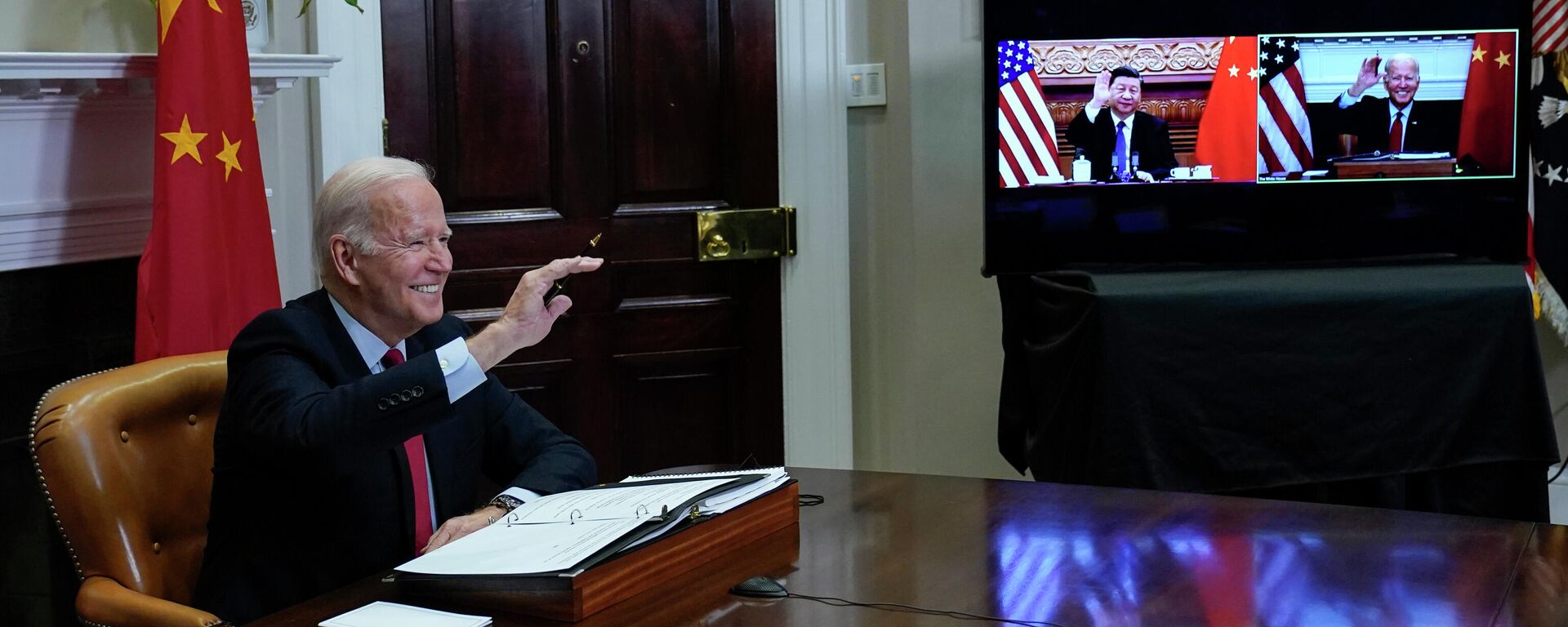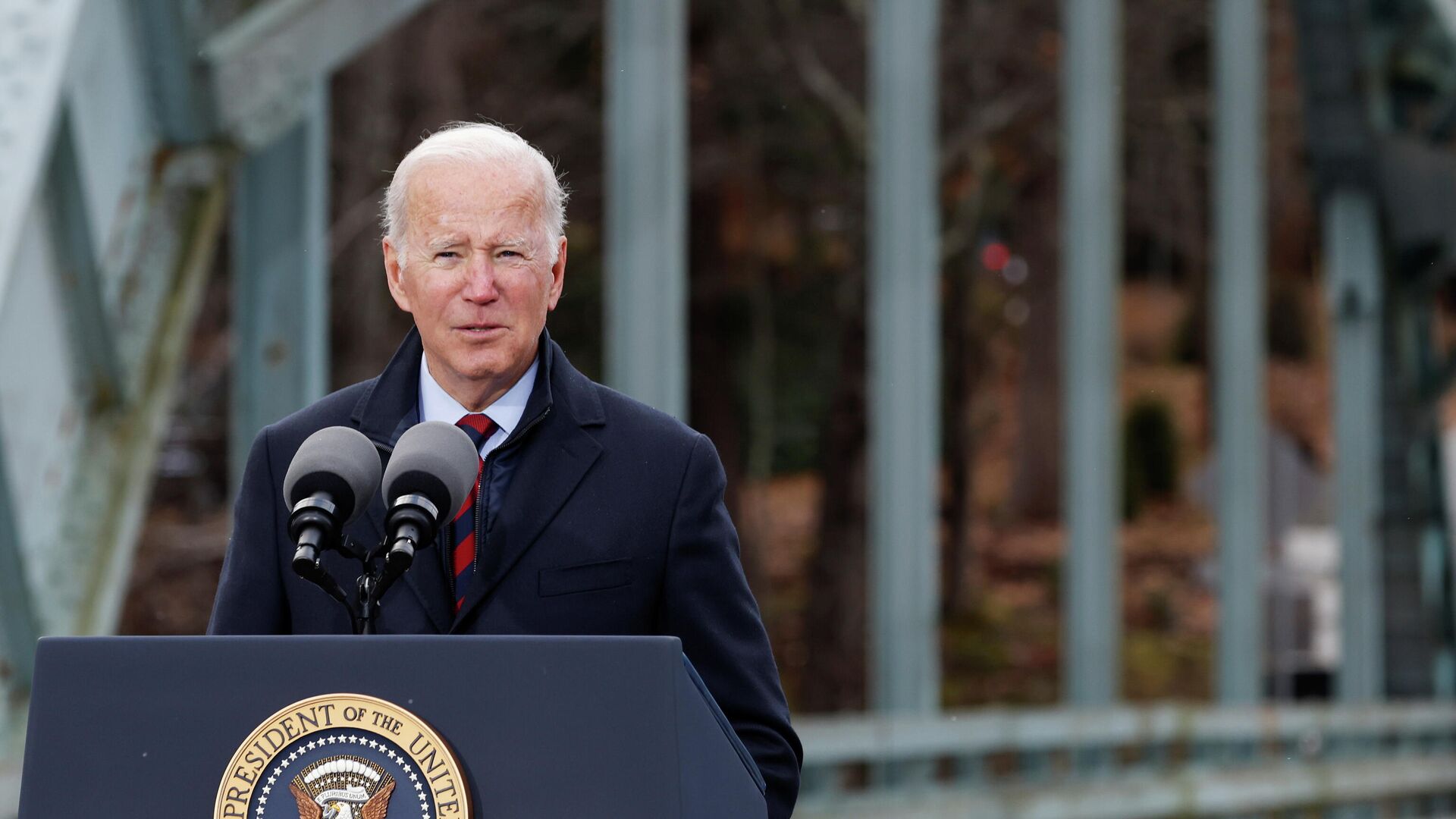https://sputnikglobe.com/20211116/biden-says-us-not-going-to-change-policy-on-taiwan-not-encouraging-independence-1090784108.html
Biden Says US 'Not Going to Change' Policy on Taiwan, Not Encouraging Independence
Biden Says US 'Not Going to Change' Policy on Taiwan, Not Encouraging Independence
Sputnik International
On Monday, Biden and Chinese leader Xi met virtually for the first time since the US president took office in January. After almost three-hour-long talks, the... 16.11.2021, Sputnik International
2021-11-16T22:04+0000
2021-11-16T22:04+0000
2023-06-19T12:43+0000
china
relations
military
one china policy
us
taiwan
https://cdn1.img.sputnikglobe.com/img/07e5/0b/10/1090784755_0:0:3073:1728_1920x0_80_0_0_bfcffcb1df102b4ab229a5d405efd3c1.jpg
President Joe Biden declared on Tuesday that the US is not pushing for the island of Taiwan's independence, and that the country is "not going to change our policy at all" regarding the island.Earlier, however, referring to the Taiwan Relations Act of 1979, which has served as the foundation for US-Taiwan relations since the recognition of the People's Republic of China, Biden told reporters in New Hampshire that "We made very clear we support the Taiwan Act, and that’s it," as per Bloomberg.According to an earlier White House readout of the talks with Xi, Biden stated during the conference that the US remained committed to its "One China" policy. When the two discussed Taiwan, Biden reminded Xi that he voted as a senator to support Taiwan's self-defense, according to National Security Adviser Jake Sullivan.In his turn, the Chinese leader told his American counterpart that if "Taiwan independence" forces breach the red line, China would have to take severe action. However, Xi noted that all differences and sensitive matters between the nations should be handled constructively.The US president agreed with the Chinese leader on that, according to Sullivan, who stated that Biden "did raise with President Xi the need for a strategic stability set of conversations."The Taiwan issue is one of the most acute in US-China bilateral relations. The United States continues to maintain informal political and military contacts with the island nation, which China regards as part of a single state under the “one China” policy.Last week, Wang Yi, China's foreign minister, warned the US against supporting pro-Taiwan independence parties, saying the US is sending them the "wrong signals." Wang's response came after Biden stated his commitment to defend Taiwan against any assault, in a reference to Beijing, while apparently confirming Taipei's admission that American forces have been stationed on the island. At the same time, China has chastised the US and European countries for attempting to strengthen their ties with Taiwan, accusing them of interfering in China's internal affairs.In October, the Taiwan authorities confirmed reports that the US has been stationing its troops on the island for at least a year, prompting Chinese media to warn that the matter could lead to war. According to official Pentagon records released earlier this month, the US has had limited numbers of troops stationed in Taiwan since at least 2008.
https://sputnikglobe.com/20211116/xi-bidens-rare-long-virtual-meet-concludes-injects-certainty-into-bilateral-ties-1090769276.html
china
taiwan
Sputnik International
feedback@sputniknews.com
+74956456601
MIA „Rossiya Segodnya“
2021
News
en_EN
Sputnik International
feedback@sputniknews.com
+74956456601
MIA „Rossiya Segodnya“
Sputnik International
feedback@sputniknews.com
+74956456601
MIA „Rossiya Segodnya“
china, relations, one china policy, us, taiwan
china, relations, one china policy, us, taiwan
Biden Says US 'Not Going to Change' Policy on Taiwan, Not Encouraging Independence
22:04 GMT 16.11.2021 (Updated: 12:43 GMT 19.06.2023) Kirill Kurevlev
Managing Editor
On Monday, Biden and Chinese leader Xi met virtually for the first time since the US president took office in January. After almost three-hour-long talks, the two leaders agreed that Washington-Beijing relations are vital not only for both countries, but for the entire globe, while also discussing other strategic issues between the two nations.
President Joe Biden declared on Tuesday that the US is not pushing for the island of Taiwan's independence, and that the country is "not going to change our policy at all" regarding the island.
"We’re not going to change our policy at all," Biden said on Tuesday as quoted by the White House pool. "They have to decide - they, Taiwan, not us - and we are not encouraging independence. We are encouraging that they do exactly what the Taiwan Act requires."
Earlier, however, referring to the Taiwan Relations Act of 1979, which has served as the foundation for US-Taiwan relations since the recognition of the People's Republic of China, Biden told reporters in New Hampshire that "We made very clear we support the Taiwan Act, and that’s it," as per Bloomberg.
"It’s independent. It makes its own decisions," he reportedly stressed.
According to an earlier White House
readout of the talks with Xi, Biden stated during the conference that the US remained committed to its "One China" policy. When the two discussed Taiwan, Biden reminded Xi that he voted as a senator to support Taiwan's self-defense, according to National Security Adviser Jake Sullivan.
In his turn, the Chinese leader told his American counterpart that if "Taiwan independence" forces
breach the red line, China would have to take severe action. However, Xi noted that all differences and sensitive matters between the nations should be handled constructively.
The US president
agreed with the Chinese leader on that, according to Sullivan, who stated that Biden "did raise with President Xi the need for a strategic stability set of conversations."

16 November 2021, 09:11 GMT
The Taiwan issue is one of the most acute in US-China bilateral relations. The United States continues to maintain informal political and military contacts with the island nation, which China regards as part of a single state under the “one China” policy.
Last week, Wang Yi, China's foreign minister,
warned the US against supporting pro-Taiwan independence parties, saying the US is sending them the "wrong signals." Wang's response came after Biden stated his commitment to defend Taiwan against any assault, in a reference to Beijing, while apparently confirming Taipei's admission that American forces have been stationed on the island. At the same time, China has chastised the US and European countries for attempting to strengthen their ties with Taiwan, accusing them of interfering in China's internal affairs.
In October, the Taiwan authorities
confirmed reports that the US has been stationing its troops on the island for at least a year, prompting Chinese media to warn that the matter could lead to war. According to official Pentagon records released earlier this month, the US
has had limited numbers of troops stationed in Taiwan since at least 2008.



